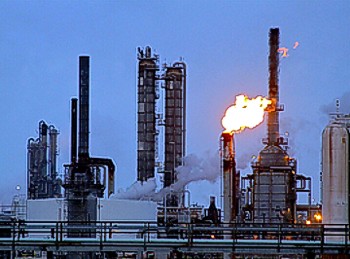Shell Oil To Pay Over $115 Million To Reduce Polluting Emissions From Its Houston Refinery
 July 15, 2013
July 15, 2013  Kyriaki (Sandy) Venetis
Kyriaki (Sandy) Venetis  Shell’s Deer Park Refinery, Texas. Photo courtesy of Roy Luck.
Shell’s Deer Park Refinery, Texas. Photo courtesy of Roy Luck.
Shell Oil Co. and its affiliated partners have agreed to resolve allegations against the refinery and chemical plant in Deer Park, Texas, just outside of Houston.
They are accused of improperly operating 12 steam-assisted flaring devices in a way that caused excess volatile organic compounds, including benzene and other hazardous pollutants to be emitted into the atmosphere, according to a complaint filed by the U.S. Justice Department on behalf of the U.S. Environmental Protection Agency.
To understand things a little better, flare stacks are gas combustion devices used primarily to burn off flammable gases. These flare stacks are used largely in industrial facilities such as petroleum refineries, chemical plants, and natural gas processing plants. They are also commonly used within oil and gas production sites that have oil wells, gas wells, offshore oil and gas rigs, and landfills.
In this settlement, Shell and its partner Deer Park Refining LP, have agreed spend over $115 million in efforts to control air pollution from its industrial flares and other processes, as well as paying about $2.6 million in civil penalties as part of resolving alleged violations against the Clean Air Act.
Specifically, Shell Oil operates the refinery, which is owned by Deer Park Refining. Shell Chemical LP owns and operates the chemical plant.
Shell is expected to spend about $100 million on new technologies to reduce air pollution from the industrial flares. The EPA explains that, “Improper operation of an industrial flare can send hundreds of tons of hazardous air pollutants into the air.”
